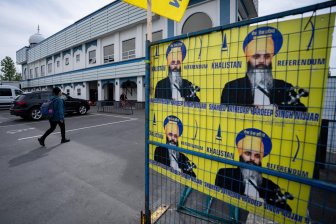NAIROBI, Kenya – The al-Qaida operative behind the 1998 U.S. Embassy bombings in Kenya and Tanzania has been killed, a Somali official said Saturday.
Somali officials have determined that a man killed by security forces on Tuesday was Fazul Abdullah Mohammed, said a spokesman for Somalia’s minister of information, Abdifatah Abdinur.
"We’ve compared the pictures of the body to his old pictures," he said. "They are the same. It is confirmed. He is the man and he is dead. The man who died is Fazul Abdullah."
Mohammed, a native of the Comoros Islands, was on the FBI’s most-wanted terrorist list and had a $5 million bounty on his head for allegedly planning the Aug. 7, 1998, embassy bombings. The blasts killed 224 people in Nairobi, Kenya and Dar es Salaam, Tanzania combined. Most of the dead were Kenyans. Twelve Americans also died.
A senior Obama administration official, speaking on condition of anonymity to discuss intelligence matters, said Mohammed was killed in a shootout with Somali government forces.
"This is a big win for global counterterrorism efforts," the official said.
"We commend the good work by the (Somali government forces)," the official added. "This is a very big deal. Fazul’s death removes one of the terrorist group’s most experienced operational planners in East Africa and has almost certainly set back operations."
Earlier in the week, a Somali security officer described the deaths of two men in Mogadishu, one of whom is now believed to have been Mohammed. The security official, Osman Nur Diriye, said that two men riding in a luxury car pulled up to a government-run checkpoint Tuesday night. After security forces found a pistol on one of the men, gunfire was exchanged. Diriye said a Somali and a man believed to be South African died. The man identified as South African is now believed to have been Mohammed, Abdinur said.
Mohammed’s death would be the third major strike against al-Qaida in the last six weeks. Navy SEALs killed al-Qaida leader Osama bin Laden on May 2 at his home in Pakistan. Just a month later, Ilyas Kashmiri, an al-Qaida leader sought in the 2008 Mumbai siege and rumoured to be a longshot choice to succeed bin Laden, was reportedly killed in a U.S. drone attack in Pakistan.
The strike against Kashmiri was not the direct result of intelligence material seized from the bin Laden compound, U.S. and Pakistan officials say. If the account of the killing at the security checkpoint killing is confirmed, it would appear Mohammed’s death is also not the result of new intelligence.
Gen. Abdikarim Yusuf Dhagabadan, Somalia’s deputy army chief, said officials at first did not know who the dead man was.
"We buried him," he said. "But soon after checking his documents, (we) exhumed his body and took his pictures and DNA. Then we had learned that he was the man wanted by the U.S. authorities.
He described the death as "similar to Osama bin Laden’s."
"He was worse to us than bin Laden," he said. "It is a victory for the world. It is a victory for Somali army."
Bill Roggio, the managing editor of The Long War Journal, said Fazul’s death is a big victory for both the U.S. and Somalia.
"Fazul is considered by U.S. intelligence officials to be al-Qaida’s most dangerous operative in Africa," he said. "He had an extensive network in the Horn of Africa and beyond that allowed him to move in and out of Somalia with ease. This made him a difficult target for security forces in the region."
According to the South African passport he was carrying with him when he was killed, Fazul left South Africa on March 19 and arrived in Tanzania the next day, Diriye, the security officer, said Saturday. The passport had no other stamps, indicating Fazul smuggled his way into Somalia, he said. Tanzania is two countries south of Somalia. Kenya lies in between the two.
Members of Somalia’s most dangerous militant group, al-Shabab, have pledged allegiance to al-Qaida. Al-Shabab’s members include veterans of the Iraq and Pakistan conflicts.
Hundreds of foreign fighters are swelling the ranks of al-Shabab militants who are trying in vain to topple the country’s weak U.N.-backed government.
Somalia has been mired in violence since 1991, when the last central government collapsed.

- Suspect in killing of temple leader Hardeep Singh Nijjar got student visa in ‘days’
- Panera to remove ‘Charged Sips’ drink from Canada amid wrongful death lawsuits
- ‘Summer of discontent’ coming over public service in-office order: unions
- AstraZeneca says it’s withdrawing COVID vaccine amid low demand


Comments